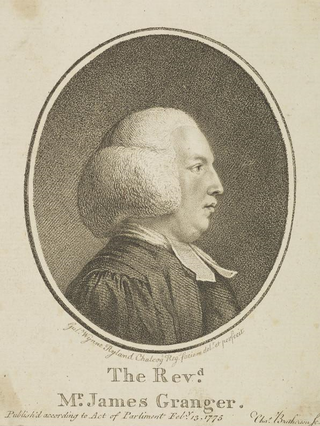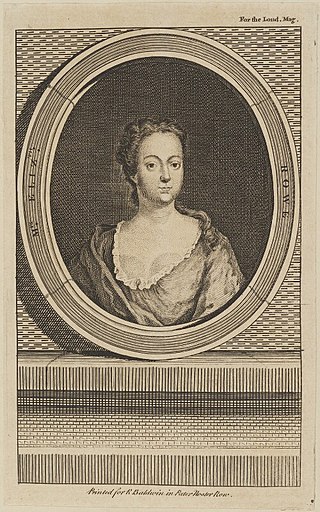
Anna Laetitia Barbauld was a prominent English poet, essayist, literary critic, editor, and author of children's literature. A prominent member of the Blue Stockings Society and a "woman of letters" who published in multiple genres, Barbauld had a successful writing career that spanned more than half a century.

Amelia Opie was an English author who published numerous novels in the Romantic period up to 1828. A Whig supporter and Bluestocking, Opie was also a leading abolitionist in Norwich, England. Hers was the first of 187,000 names presented to the British Parliament on a petition from women to stop slavery.

Bluestocking is a derogatory term for an educated, intellectual woman, originally a member of the 18th-century Blue Stockings Society from England led by the hostess and critic Elizabeth Montagu (1718–1800), the "Queen of the Blues", including Elizabeth Vesey (1715–1791), Hester Chapone (1727–1801) and the classicist Elizabeth Carter (1717–1806). In the following generation came Hester Lynch Piozzi (1741–1821), Hannah More (1745–1833) and Frances Burney (1752–1840). The term now more broadly applies to women who show interest in literary or intellectual matters.

Elizabeth Carter was an English poet, classicist, writer, translator, and linguist. As one of the Bluestocking Circle that surrounded Elizabeth Montagu, she earned respect for the first English translation of the 2nd-century Discourses of Epictetus. She also published poems and translated from French and Italian, and corresponded profusely. Among her many eminent friends were Elizabeth Montagu, Hannah More, Hester Chapone and other Bluestocking members. Also close friends were Anne Hunter, a poet and socialite, and Mary Delany. She befriended Samuel Johnson, editing some editions of his periodical The Rambler.

Hester ChaponenéeMulso, was an English writer of conduct books for women. She became associated with the London Bluestockings.

James Granger (1723–1776) was an English clergyman, biographer, and print collector. He is now known as the author of the Biographical History of England from Egbert the Great to the Revolution (1769). Granger was an early advocate of animal rights.

Elizabeth Montagu was a British social reformer, patron of the arts, salonnière, literary critic and writer, who helped to organize and lead the Blue Stockings Society. Her parents were both from wealthy families with strong ties to the British peerage and learned life. She was sister to Sarah Scott, author of A Description of Millenium [sic] Hall and the Country Adjacent. She married Edward Montagu, a man with extensive landholdings, to become one of the richer women of her era. She devoted this fortune to fostering English and Scottish literature and to the relief of the poor.

Clara Reeve was an English novelist best known for the Gothic novel The Old English Baron (1777). She also wrote an innovative history of prose fiction, The Progress of Romance (1785). Her first work was a translation from Latin, at the time a language unusual for a woman to learn. She was a near-contemporary of the bluestockings ladies of Elizabeth Montague's circle.

Selina Hastings, Countess of Huntingdon was an English Methodist leader who played a prominent part in the religious revival of the 18th century and the Methodist movement in England and Wales. She founded an evangelical branch in England and Sierra Leone, known as the Countess of Huntingdon's Connexion.

Elizabeth Singer Rowe was an English poet, essayist and fiction writer called "the ornament of her sex and age" and the "Heavenly Singer". She was among 18th-century England's most widely read authors. She wrote mainly religious poetry, but her best-known work, Friendship in Death (1728), is a Jansenist miscellany of imaginary letters from the dead to the living. Despite a posthumous reputation as a pious, bereaved recluse, Rowe corresponded widely and was involved in local concerns at Frome in her native Somerset. She remained popular into the 19th century on both sides of the Atlantic and in translation. Though little read today, scholars have called her stylistically and thematically radical for her time.

The Blue Stockings Society was an informal women's social and educational movement in England in the mid-18th century that emphasised education and mutual cooperation. It was founded in the early 1750s by Elizabeth Montagu, Elizabeth Vesey and others as a literary discussion group, a step away from traditional, non-intellectual women's activities. Both men and women were invited to attend, including the botanist, translator and publisher Benjamin Stillingfleet, who, due to his financial standing, did not dress for the occasion as formally as was customary and deemed "proper", in consequence appearing in everyday blue worsted stockings.

Elizabeth Ann Sheridan was an English singer who was known to have possessed great beauty. She was the subject of several paintings by Thomas Gainsborough, who was a family friend, Joshua Reynolds and Richard Samuel. An adept poet and writer, she became involved with the Blue Stockings Society and participated in Whig politics.
Jane Brereton (1685–1740) was a Welsh poet who wrote in English. She was notable as a correspondent for The Gentleman's Magazine.

Richard Samuel was an English portrait painter who won several prestigious medals in the 1770s in London. He is known for a small number of paintings including what came to be known as The Nine Living Muses of Great Britain of 1778 in which he painted the nine leading blue stocking women of his time.

Frances Evelyn "Fanny" Boscawen was an English literary hostess, correspondent and member of the Blue Stockings Society. She was born Frances Evelyn Glanville on 23 July 1719 at St Clere, Kemsing, Kent. In 1742 she married Admiral The Hon. Edward Boscawen (1711–1761). When his navy work took him away from home, his wife would send him passages from her journal, some of which were later published.
Dr. Lucy Peltz is Head of Collection Displays and Senior Curator 18th Century Collections at the National Portrait Gallery, London.

Gillian Perry is professor of history of art at the Open University. She is a specialist in eighteenth century portraiture and has written two books on the actress in art. In 2011/12 she curated the exhibition The First Actresses at the National Portrait Gallery in London which was widely reviewed.

Georgiana Jane Henderson or Georgiana Keate was an English painter. She sat for two noted portraits and was the daughter and mother of other noted artists.
Sarah Chapone, born Sarah Kirkham and often referred to as Mrs Chapone, was an English legal theorist, pamphleteer, and prolific letter writer. She is best known for the treatise The Hardships of the English Laws in Relation to Wives, published anonymously in 1735.

Portraits in the Characters of the Muses in the Temple of Apollo is a 1778 painting by the English artist Richard Samuel. It depicts nine prominent British literary and artistic women as Muses in the Temple of Apollo and is also known as The Nine Living Muses of Great Britain. It was exhibited at the Royal Academy's Summer Exhibition in 1779.
















